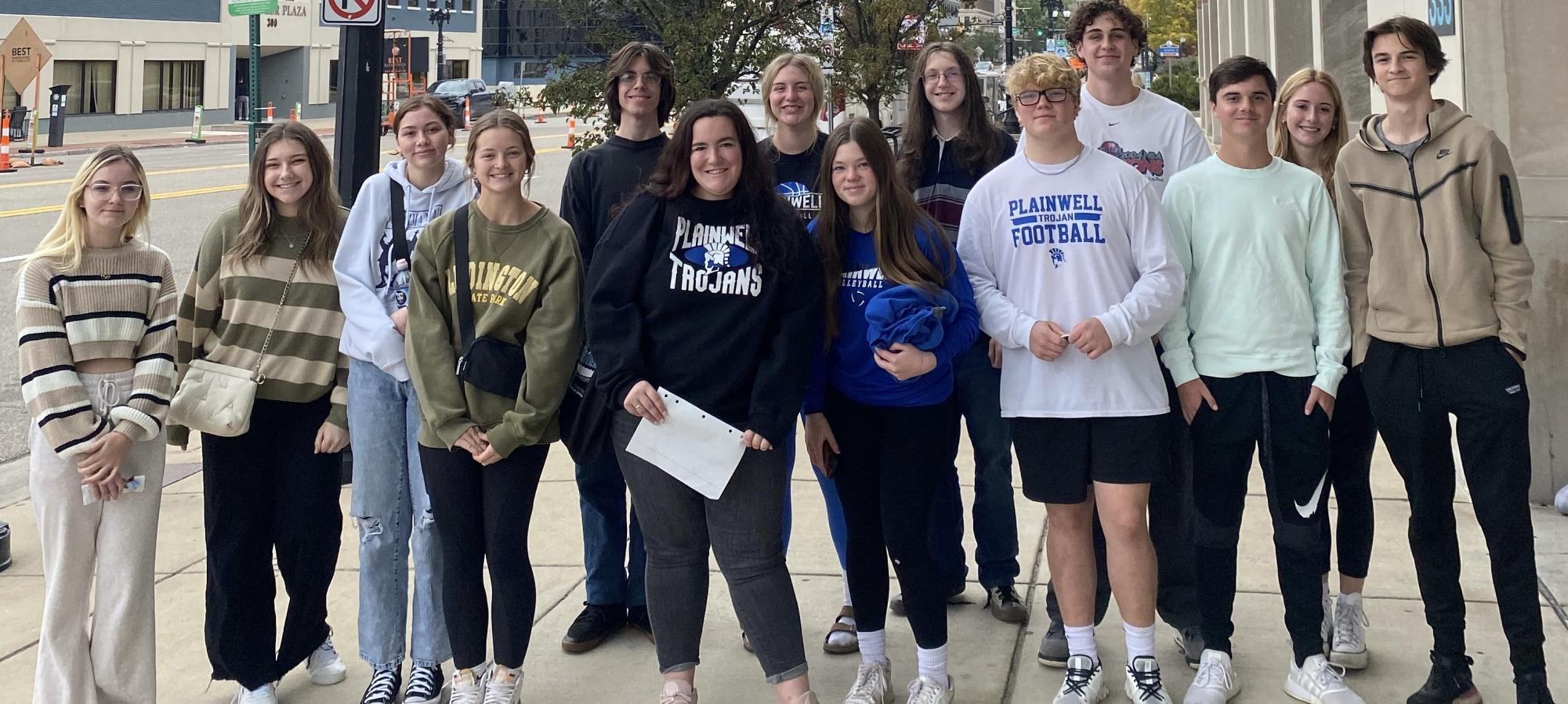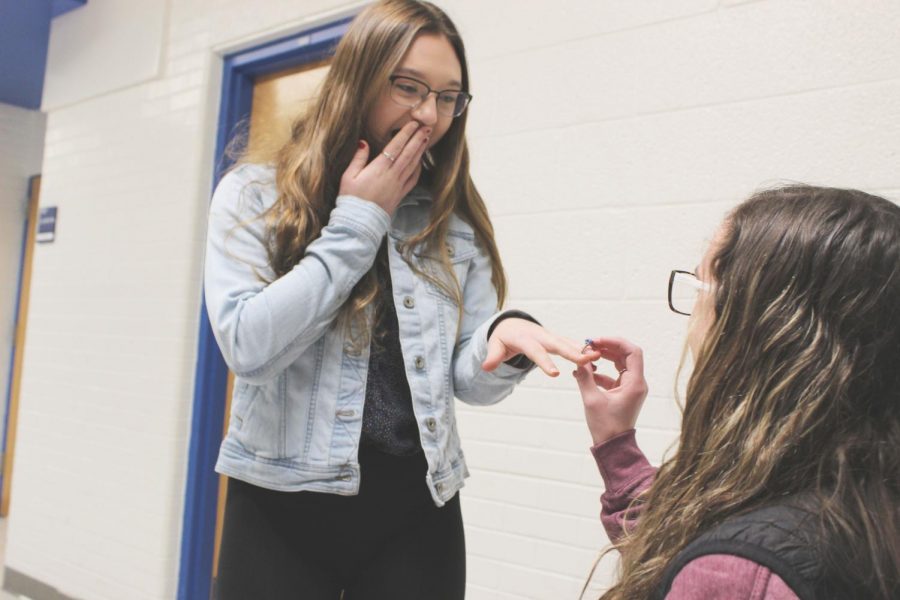Four Types of Love
Olivia Crandall gasps in excitement as Maddie Moore fake proposes.
February 27, 2019
People throw around the word “love” all the time, “I love pizza,” or “I love the color blue,” but actually love is much deeper than that.
Love can be many things. It can be romantic, endearing, warmhearted, and selfless. These feelings are communicated through four Greek words: Eros, Storge, Philia, and Agape.
Eros
When love comes to mind, one usually thinks of it as romantic, something with passion and drive. That form of love is Eros, one of four kinds. Eros is romantic and affectionate.
Front office administrative assistant Kim Veen has been married to Dan Veen for 22 years; Feb. 8 was their anniversary. If she had to describe her relationship with her husband it would be: “committed.”
They are always caring for one another, whether it’s helping when the other is down, or just making sure that they are taking enough time for themselves. When this happens they “rise to the occasion and pull through for the other.”
This particular kind of love is rather different from the other forms of love.
“For us, I never have to question his commitment to me, and even if the relationship is strained, I know we will go through it together,” said Veen.
Most people want this kind of relationship. One with passionate affection, and a partner who will support them, and always have the other’s best interest at heart. Storge
This kind of love is steady and sure, a love that occurs naturally over time. What makes it different from the other kinds of love, is the fact that it is natural, it is not situational, nor is it unconditional; it is instinct. It can be between a parent and their child, between siblings, or it can even occur in long-term marriages. This kind of love is steady and sure, a love that occurs naturally over time.
Nolan and Kenedie Troff ‘19 are twins. “We don’t do the typical fighting and competing like most siblings,” said Kenedie. But Nolan is quick to point out they’re not very serious with each other, either.
“When we were younger he was a typical boy, but throughout the years I’ve seen him mature into a good man,” said Kenedie. During their time together, both have learned to care for the other, as well as recognize the other’s strengths and flaws.
“She is kind-hearted, and a jokester,” said Nolan.
“He is very empathetic towards other people, he is also sometimes funny, but sometimes a pain in my butt,” said Kenedie. But of course, these two are not the only ones with this special bond.
Twin sisters Audrey Bobb and Elizabeth Bobb ‘20 also share this strong connection. What Audrey appreciates most about having a twin is that she’s always been there for her.
“You tell me when I am being stupid, but you’re there for me, like: ‘Audrey you’re being stupid stop,’” said Audrey. Besides her sister’s input, what Audrey loves most about Elizabeth, is her strong personality, “when she wants or believes in something, she goes for it.”
Elizabeth also explains one of her favorite qualities about Audrey: “She can make things that aren’t fun, fun! I’m like: ‘this is boring’ and shes like: ‘ha, you thought.’” They both get along really well and have a lot of fun with each other.
Both pair of siblings have grown together and learned to love each other very much. Their relationships are familiar, and they have developed a dependency on one another, and Storge is exactly that: A fondness that over time becomes instinctual; a comfortable and natural love.
Phileo
Phileo refers to brotherly love, and is most often exhibited in the relationships of close friends. It is based on the qualities one finds admirable about the other.
It is a emotional connection that goes much deeper than casual acquaintances. Not someone that you hang out with for convenience purposes, but some who is close to you. A close friend is someone you can share personal problems with, someone you can trust to help in troubling times, and will support you when you need confidence.
Though it is a deep connection, it is still a responsive love, an example is: ‘I love you, because you love me’. If the other does not reciprocate, then the feeling will not last, thus a conditional love.
Despite that fact it is still an important kind of love. Phileo is a mutual fondness and genuine appreciation for the other’s company. It is generous and gives with no expectancy of a reward in turn.
Brett Taylor ‘20 and Aiden Brown ‘20 have been friends for four years, and know each other very well, and maybe a little too much.
He describes their friendship this way: “Brothers, just kinda family. Sometimes we’re at each other’s throats, then other times we’re best pals,” said Taylor.
They both don’t really disagree much and have a lot in common, they’re both conservative in politics, enjoy video games, as well as watch Naruto. They both can find a mutual connection within these hobbies.
“We are both competitive, but got each other’s backs at the same time,” said Brown. It is a mutual connection and appreciative love, and these best friends are an example, as they genuinely like and care for one another.
Agape
And finally: divine love. Unlike the others it’s not just an emotion or desire, it is the will to be committed. It is self-sacrificing, and it is unconditional regardless of circumstance.
David Kohns ‘19 is part of the worship team at Renovation Church, he is also a part of student leadership, which involves being an integral part of the spiritual development of teens as a part of the church.
“I grew up knowing that there were three people who will always love me; my dad, my mom, and God,” said Kohns. At age 13, Kohns was baptized, in a public declaration to dedicate his life to God.
He says his faith in God gives him calmness and hope, amidst troubling times. He has security in the knowledge that God has a plan that will succeed in time. A year after being baptized that belief was tested.
“When I was 14 I found out that my dad had lost his job, and my family depended on him having this job for most of our finances. My faith in God gave me peace that everything would be okay, not necessarily that my dad would get his job back, or that my family would recover financially, but that everything would be okay in the end.” said Kohns.
“I love God with all I am because he gave all he is to save me,” said Kohns. God’s love is divine, and giving to all those unworthy, and Kohns offers his love back in thankfulness. He describes his love for God as “without pretense, all-encompassing, and never-ending,” which is truly divine love.


